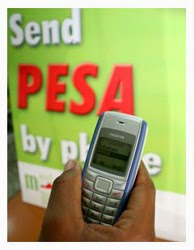Financial institutions in Kenya plan to leverage on mobile money transfer technology to enlist more Kenyans in the formal banking system.
A player in the sector believes this will go a long way in boosting the agency-banking model while at the same time reducing the cost of doing financial transactions.
Equity Bank Chief Executive Officer James Mwangi said that while mobile money transfer has been successful in easing financial access, the next phase is to get money from the un-banked population into the formal economy.
“What we are really pushing for is that Kenyans should not be dis-intermediated. If we don’t converge telecoms money transfer with banking facilities, what we are very busy doing is disabling Kenyans from having financial access,” Mr Mwangi said stressing that Kenyans needed more than money transfer services.
According to Central Bank statistics, the mobile money platform from telecom operators moves in excess of Sh3 billion a day, an indication why financial institutions are eager to take advantage of the system.
Mr Mwangi said interfacing telecom services with those from financial institutions would undoubtedly make Kenya the regional hub for financial services owing to the ease of accessing credit.
“It is important we interface the two so that Kenyans continue to build a banking history as well as a credit history that guarantees them access to financial services,” he said.
Since the introduction of money transfer services in 2007 with Safaricom’s M-PESA, Kenya has become a case study to the world given its success. Since then, all four mobile operators have introduced similar services with 58 percent out of the 20 million mobile users embracing the service.
CBK Governor Prof Njunguna Ndung’u has in the past indicated the plan is to eventually have a financial system that would see agency banking change the brick and mortar banking concept and which will deepen financial services especially in rural areas.
Equity Bank has been at the forefront of bridging the gap by partnering with mobile operators to create a platform that essentially ropes money into the banking system.
Speaking during the signing of a partnership agreement with Essar Telecom’s yuCash service, Mr Mwangi said such partnerships would fast tack the process.
Through the partnership, yuCash customers will be able to transfer funds from their yuCash accounts to their Equity Bank accounts directly from their mobile phones and from their bank accounts to their yuCash accounts.
Designed as what is technically known as a Mapped Account, Mr Mwangi added that yuCash customers will alongside basic money transfer now manage to send and receive cash across the various local mobile network operators.
“Through such partnerships, we have managed to significantly bridge the gap between the banked and un-banked masses as part of our overall goal to boost social-financial inclusion as a poverty alleviation strategy,” he said.
Essar Telecom Country Manager Atul Chaturvedi said the deal would help the operator deliver services that have been informed by the needs of the ordinary Kenyan and powered by innovative technology acquired from global industry leaders such as Obopay.
“yuCash presents a significant step towards delivering universal access to financial services through innovative mobile banking and payments services and working with Equity Bank is a step in the right direction essentially geared at meeting our customer expectations,” Mr Chaturvedi said.











